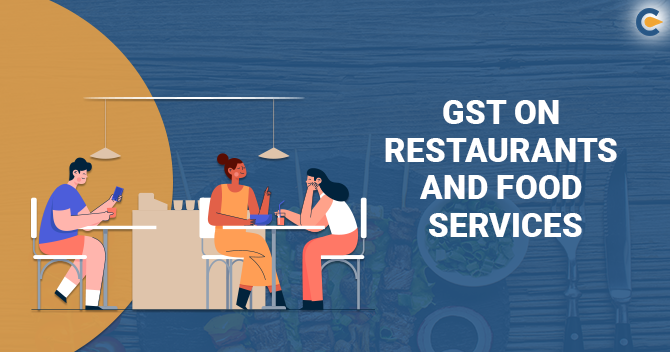Restaurant and food services is the fastest growing business in India. Due to few major changes in the framework of tax collection, this business is being impacted. Introduction of GST has created some perplexity among the restaurant proprietors. This scheme was basically introduced in order to abrogate all sorts of extra charging of money schemes through which the retailers would make money. This reform changed the consistency cost for the taxpayer and was initiated with a uniform entity all across the states and the tax structure too was harmonized. Earlier, consumers would pay Service Tax, VAT and additional service charges on every restaurant bill but ever since GST on Restaurants got introduced, extra and unnecessary charges were excluded. This regime brings out beneficial along with disadvantageous sides of it.
GST on Restaurants and Food Service Business
GST bill is more like a boon to the organized traders as they will be getting a single market for buying raw materials from any part of the country – as the tax will be the same. The GST on Restaurants will surely help the restaurants in order to purchase raw materials at a much cheaper rate. The final bill can be much easier to understand by the end customers as it is only inclusive of the GST. Such GST rate structure has been decided where the taxes are levied ranging from 5% to 28%.
According to such GST rates, five-star hotels will be charged at 28%. It is more of good news for small restaurants which would have a positive impact on the Cloud-kitchen and food delivery businesses as they would be charged significantly less as compared to the AC based establishments and high-end restaurants.


Before Introduction of GST
Previously, dining at an AC restaurant was considered to be a supply of both goods and services and that is why VAT, as well as service tax both, were applicable which made up almost 21% of the tax to be spent from the pocket of the end consumer. But the major impact of GST here is that food and beverages served would be treated as the rendering of services.
However, service of liquor would not come under the GST regime. In order to serve alcohol, the restaurants will need to maintain two separate streams of transactions, and separate bills are needed to be provided in case alcohol is consumed that would be GST for food and VAT for alcohol. This leads to a more negative impact of GST on restaurants as different states will have different VAT rates resulting in operational challenges.
Read our article:Update on 41st GST Council Meeting
Multiple Taxes
The food business is presently burdened with a lot of taxes at each and every point starting from the acquisition of raw materials to the sales of finished items. There are multiple taxes which are charged from customers at the final bill which may be a vast turn off for the customers and also plays a significant role in turning them away. There are levels of indirect taxes, at the Central level, State level and extra Excise and Custom duties give huge obstacles in the proper functioning of the restaurant business.
Recurring changes in the law
Recurring changes in the law and many other registrations required to open a new restaurant business undertaking are usually noteworthy, particularly to first –time owners of a restaurant. With the emergence of new changes in tax arrangements, the GST will effect, for the most part, the promotional strategy of restaurants and foodservice undertakings and will give consumers clear picture of taxes they pay in restaurants. Including a single tax slab will produce a standardized price and will give benefits to the customers directly by giving law & uncomplicated to read bills whenever they eat out. Reducing tax will expand consumption which will generate more employment opportunities enhancing the Make in India initiative.
Disadvantages of GST will be on medium scale restaurants as they will be imposed into the tax slab of 28th and tax for budget or luxury hotel business is clearly too extensive. GST implementing is going to have a ratified effect on the Government’s income.
Post GST Regime
Under the post-GST law, the output service tax liability of restaurant business owners got altered with credit of input VAT on commodity consumed. However, underneath the new regime, GST includes both these taxes into itself and for that reason, no matter what the product or the services are, adjustment of credit of input is at one’s disposal against output liability. This may work the best for furthering the working capital of those restaurant businesses and customers will not need to settle for second-classed quality of food and services provided. Therefore, restaurants and foodservice[1] undertakings must draw an outline of the future in view of assessment of GST and its effect on their businesses and tasks compulsorily.
Conclusion
In most of the cases, restaurants make a lot of supplies from unregistered dealers. Under VAT, restaurants and small eateries were not liable to purchase tax on such purchases that were made from unregistered vendors. However, GST Registration for restaurants have been classified as services and hence the reverse charge mechanism that was adopted through the earlier regime by GST states that the restaurant owners will have to pay tax at full rate on all the supplies that have been purchased from unregistered owners. Such a mechanism is bound to impact profitability at some point.
Read our article:FSSAI License Requirement for Export of Food Products from India











